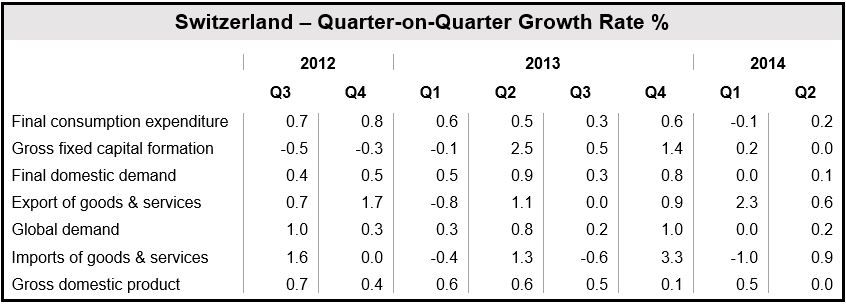The Swiss economy posted zero growth in Q2 2014 compared to the first quarter, according to data published by the State Secretariat for Economic Affairs (SECO). Analysts had expected some kind of growth, despite weak demand in the rest of Europe.
The country’s balance of trade in goods and services contributed negatively to GDP (gross domestic product) growth, while private household consumption made a slightly positive contribution.
Investments in equipment and construction remained unchanged in Q2 2014.
On the production side, financial services, the wholesale sector and industry failed to boost growth, and neither did public sector areas.
GDP in Q2 2014 grew by 0.6% compared to Q2 2013.
Q2 2014 household consumption expenditure and that from NPOs (non-profit organizations) grew by 0.2% over the previous quarter. Housing, recreation and culture contributed positively to growth, while healthcare spending declined.
Social security and general government spending declined for the second successive quarter (-0.3%).
Below are some highlighted data published by SECO today, comparing growth/contraction in Q2 to Q1:
- Gross fixed investment: 0.0%,
- Investment in equipment: +0.7%,
- Investments in construction: -0.7%,
- Goods exports (excl. precious metals, jewelry, gems, works of arts & antiques): +0.7%. Jewelry exports rose significantly while chemical and pharmaceuticals increased marginally.
- Goods imports (excl. precious metals, jewelry, gems, works of arts & antiques): +0.7%. Imports of chemical and pharmaceutical products posted sharp gains, while imports of intruments, watches and jewelry were markedly lower.
- Exports of services (incl. tourism): +0.6%.
- Imports of services (incl. tourism): +2.4%.
There was virtually no change between Q1 and Q2 in production, with just water supply, energy and industry making a small positive contribution to GDP.
(Data source: SECO)
Q2 2014 below expectations
In an interview with the BBC, Maxime Botteron from Credit Suisse said the results were well below expectation. “We expected a bit more growth. The trend in exports is not a big surprise. Trade data so far already pointed to a rather weak contribution of exports. What is a bit more surprising is the weak investment spending, especially in the construction sector,” he added.
Switzerland expanded sanctions against Russia
Although officially a neutral nation, Switzerland joined the US, EU and other allies and expanded its sanctions list against Russia on August 27. Switzerland says it does not wish to be used to bypass EU sanctions.
According to an official statement published by SECO:
“The Federal Council decided to widen its current policy and to take all the measures required to ensure that the most recent sanctions imposed by the European Union cannot be circumvented via Swiss territory. Today the Federal Council decided on the necessary measures.”
Within the list of the expanded sanctions are five Russian banks and eleven prominent Russian nationals.
Uncertainty about Ukraine and parts of the Middle East, as well as the economic sanctions against Russia are believed to be affecting the economies of several European countries. In Q2 2014, German GDP shrank, while the Eurozone’s reported zero growth.

